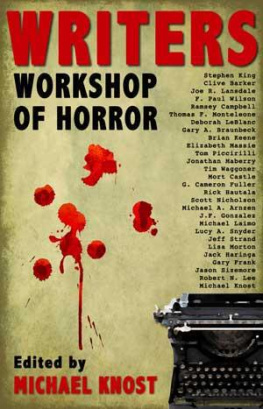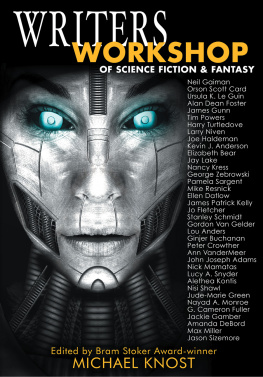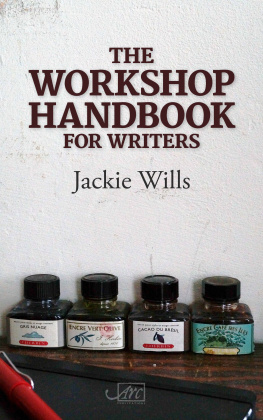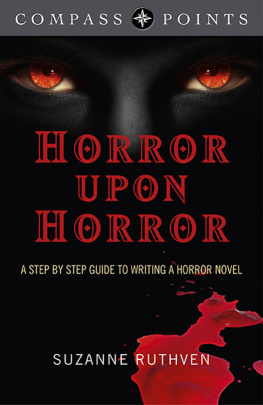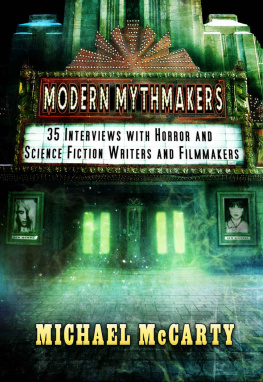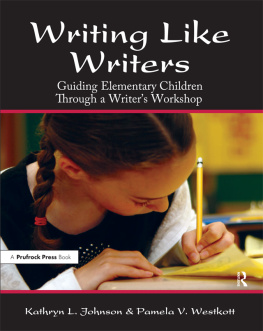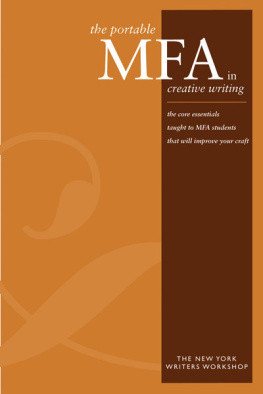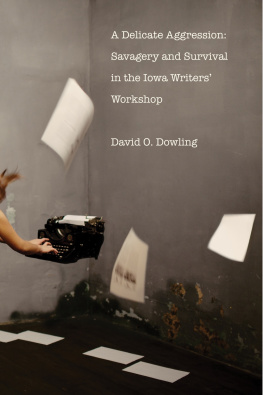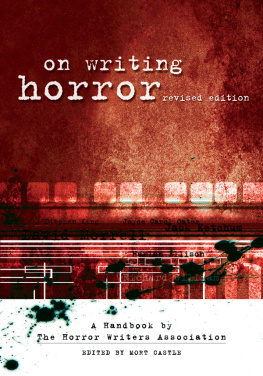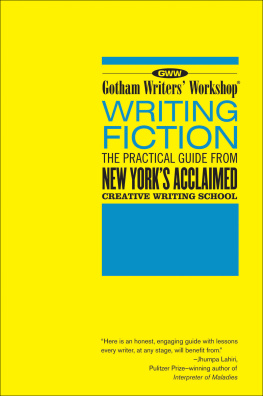Michael Knost - Writers Workshop of Horror
Here you can read online Michael Knost - Writers Workshop of Horror full text of the book (entire story) in english for free. Download pdf and epub, get meaning, cover and reviews about this ebook. year: 2009, publisher: Woodland Press, LLC, genre: Detective and thriller. Description of the work, (preface) as well as reviews are available. Best literature library LitArk.com created for fans of good reading and offers a wide selection of genres:
Romance novel
Science fiction
Adventure
Detective
Science
History
Home and family
Prose
Art
Politics
Computer
Non-fiction
Religion
Business
Children
Humor
Choose a favorite category and find really read worthwhile books. Enjoy immersion in the world of imagination, feel the emotions of the characters or learn something new for yourself, make an fascinating discovery.
- Book:Writers Workshop of Horror
- Author:
- Publisher:Woodland Press, LLC
- Genre:
- Year:2009
- Rating:3 / 5
- Favourites:Add to favourites
- Your mark:
- 60
- 1
- 2
- 3
- 4
- 5
Writers Workshop of Horror: summary, description and annotation
We offer to read an annotation, description, summary or preface (depends on what the author of the book "Writers Workshop of Horror" wrote himself). If you haven't found the necessary information about the book — write in the comments, we will try to find it.
Writers Workshop of Horror — read online for free the complete book (whole text) full work
Below is the text of the book, divided by pages. System saving the place of the last page read, allows you to conveniently read the book "Writers Workshop of Horror" online for free, without having to search again every time where you left off. Put a bookmark, and you can go to the page where you finished reading at any time.
Font size:
Interval:
Bookmark:





I DIDN'T HAVE A MENTOR when I started writing. In fact, living in southern West Virginia, I didn't know a single soul who remotely came close to being a writer. I knew I was making novice mistakes, but I had no way of differentiating what was good and what was bad. Don't get me wrong, I had worked in radio for twenty years so I knew how to communicate, and I felt I was a decent storyteller. But I was smart enough to know I was getting rejection letters for a reason.
I eventually discovered a few online critique groups, but quickly realized most participants offered amateur and / or ill-informed advice. These folksmost of whom have never publishedwere offering suggestions about a craft they knew nothing about. This is why you should always know your fellow critiquers. And keep in mind these folks can only offer an opinion.
It wasn't until I attended a few nationally recognized workshops and boot camps that I began recognizing my writing problems. Not only did I benefit from the critiques and lessons, I also found the networking to be equally valuable. Meeting other writers in the same boat (and level) was priceless. Long after the workshops, we continued critiquing one another's works.
I wish I could have read Writers Workshop of Horror during my first year in the craft. I'm sure I could have developed faster, improving my work by leaps and bounds with its advice. This is why this project is so important to me. If you are a beginner, I hope you master the basics. If you've been writing for a while, I hope you learn a few new tricks.
I would like to point out that I have taken a slightly different approach to editing this project. I wanted to make sure each article or inter-
view retained its individuality and author style. I was not attempting to make this a uniformed whole ... I merely wanted it to be a diverse collection of advice from multiple viewpoints and tone. Because of this, you will find varying structures and styles that solely belong to each contributing author. This means Ramsey Campbell's piece remains untouched when it comes to his unique style and structure. The same goes for Joe R. Lansdale, Brian Keene, and every other contributor.
My involvement was merely that of a contractor overseeing the building of a beautiful home, as contractors hire the best individuals according to his or her needs. The contractor doesn't hire an individual who excels in drywall to wire the house ... He or she hires the best electrician. Then he or she hires the drywall specialist to do the drywalling. In the same vein, I invited some of the best in the business to deliver pieces on specific craft elements as it pertains to the dark fiction genres.
This book is meant to focus solely on honing the craft of writing. You won't find anything in these pages on marketing, promotions, or submission tips. That's another book for another time. What you will find is solid advicefrom professionals of every publishing levelon how to improve your writing.
Although this project is centered on writing horror and /or dark fiction, the principles and advice will transcend all genres and all forms of writing. It doesn't matter if you write romance, science fiction, western, mysteries, fantasy, or memoirs, you will benefit from the information, ultimately improving your craft by bringing polished elements of horror, fear, anxiety, or dread to your work when needed.
I salute you for your desire to improve your work... Here's to creating better nightmares.

ELIZABETH MASSIE is a two-time Bram Stoker Award-winning author whose books include Sineater, Wire Mesh Mothers, Welcome Back to the Night, Shadow Dreams, Homeplace, and many others. Her short fiction has appeared in numerous magazines and anthologies such as Outsiders, Hottest Blood, Years Best Fantasy and Horror 4, Best New Horror 2 and 17, Exotic Gothic 2, and The Mammoth Book of Vampire Stories by Women. Upcoming works for 2009 include the novel DD Murphry, Secret Policeman (co-authored with Alan M. Clark) and a comic book featuring The Phantom and his twin sister, Julie. In addition to writing, Beth is the creator of the Skeeryvilletown cartoon universe. She shares life and abode in the Shenandoah Valley of Virginia with illustrator Cort-ney Skinner. Her website is www.elizabethmassie.com, and items featuring her Skeeryvilletown cartoon creatures are available at http://www.cafepress.com/skeeryvilletown.
"When he opened the glove compartment he expected to find the registration papers the policeman had just requested, not a shriveled, blackened hand sawed off at the wrist."
Okay, now that I have your attention, let's talk about writing effective or intriguing openings to horror stories or novels.
What makes you stop along the street and stare? Probably not the ordinary-looking people hurrying here and there on their ways to work or the gym. Probably not the stoplight, or the newspaper box, or the wheeled plastic garbage bin waiting for the city collection truck to come by and claim its contents.
But what if one of the people in that ordinary, hurrying herd on the street has only one eye in the middle of her head? What if the stoplight began to flash out a repeated auditory warning message"There is only an hour left!"as it continued to flick back and forth from green to yellow to red? What if the front page of the newspaper in the box read, "Obama Decides to Step DownEncourages All to Vote Palin For President!" What if you witnessed several dark red, slithering, foot-long, slug-like creatures crawling up and out of the garbage bin but no one else could see them?
Now all those circumstances would very likely cause you to stop and stare. And then wonder. And then fear. All within a matter of seconds, probably. This is how you need to think about the openings of your horror stories or novels. Some of the most effective horror stories are set in initially recognizable times and places, with initially recognizable people. But then it all gets turned on its head.
A good story connects to the reader on both an emotional and intellectual level. In the case of horror, the emotional and intellectual level is somewhere in the dark recesses of the heart and mind. Your opening is the first and very possibly last opportunity to make this connection. Because if you don't grab the reader by the heart or the mind and even the gut, then he or she will very likely move on to another story. Unless it's your friend reading your story and he or she has already promised to let you know what they think about the story when they've finished reading. And as you well know, friends aren't always as forthcoming about shortcomings as they should be.
Your first sentence or at least your first paragraph should tease the reader. An effective opening is sometimes called a "hook." You read it, you feel that sharp metal barb catch in your mind or heart or gut, and you are compelled to move deeper into the story, to read more and find out what will happen next. And that's a key right therewhat will happen next. Because if something doesn't happen right off the bat, or if the reader doesn't feel something impending, then there can't be a "happens next." And your reader will toss your story or novel down and go off to get a beer and watch "Speeders" or "Cash Cab."
Font size:
Interval:
Bookmark:
Similar books «Writers Workshop of Horror»
Look at similar books to Writers Workshop of Horror. We have selected literature similar in name and meaning in the hope of providing readers with more options to find new, interesting, not yet read works.
Discussion, reviews of the book Writers Workshop of Horror and just readers' own opinions. Leave your comments, write what you think about the work, its meaning or the main characters. Specify what exactly you liked and what you didn't like, and why you think so.

